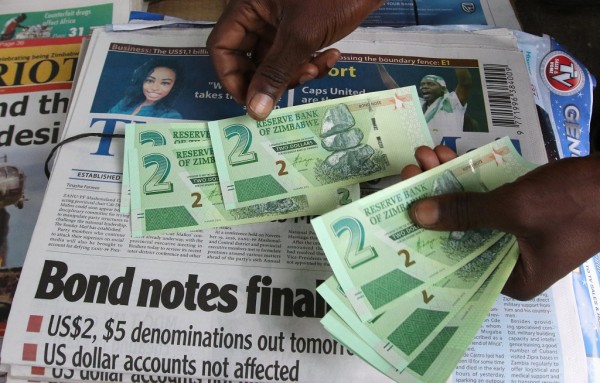
The Sunday Mail

Clemence Machadu Insight —
Howdy folks!
Have you noticed how there is a thriving market for currencies in the streets out there?
If you throw a stone at areas around Harare’s Roadport, it will hit a money-changer! Well, in fact, you might actually hit two money-changers with one stone.
It’s always a hive of activity at Fourth Street Bus Terminus in the capital, and other different places as money-changers jostle for clients.
If Jesus was to descend right now, He would probably need a bigger whip of chords to drive them all away. And the three main traded currencies are the South African rand, greenback and bond notes.
Bond notes have a rate there, when exchanging with the greenback.
If one changes US$100 on the parallel market, they can get as much as US$107 worth of bond notes. They can then go and shop in a supermarket that treats the US dollar and bond note as equals.
That way, they buy more compared to when using US dollars straight.
So, there is an “incentive” to purchase with bond notes in a supermarket if you initially had US dollars. You are rewarded 7 cents for every US dollar you change.
You do not have to be involved in the hustles of exporting where you get an incentive of just up to 5 percent.
You know, folks, I always hate it when those who have not done anything start to be rewarded more than those who would have worked extra hard.
You all know how it ended during the “burning” days of the Zimbabwe dollar era.
Of course, officially, the bond note is fixed to the greenback on a one-to-one basis, but those who are taking their bond notes to the banks, looking for the US dollar, do not easily get the Benjamins.
The banks have to first place you somewhere in the priority list categories and, given the greenback scarcity, it’s difficult to easily get it.
What is happening to the bond note, in this particular case, is actually not alien to the basic principles of economics which say that when demand outstrips supply, there will be upward pressure on the price.
This disparity of bond notes and the greenback on the black market implies that the current market equilibrium at the “bonded” exchange rate is now unfit for the current supply and demand relationship. In a perfectly competitive market such as ours, a shortage in supply is guaranteed to result in a shift in the equilibrium point, transitioning towards a higher price point due to the limited supply availability.
And that somehow explains the bond notes narrative on the black market.
Since we are in a perfectively competitively market where everybody knows yese iri kuitika; some businesses, which are fundamentally driven by self-interest, know that if they sell their products on cash basis, there is an incentive in them first “burning” their US dollars into bond notes on the black market before they bank them.
Folks, once we start having a situation whereby people can wake up with more money without being productive at all, it means that we are no longer in equilibrium.
It means that we need to start taking steps towards the direction of a new state where economic forces are balanced.
Should it continue to be business as usual when people are making an arbitrage on bond notes on the black market?
We have had similar experiences before during the Zimbabwe dollar era when we used to have fixed exchange rate regimes.
In January 2009, for instance, the official exchange rate for the Zimbabwe dollar was US$1:Z$22, whereas the parallel market rate was US$1:Z$2 trillion.
Nobody expected to get hard currency from banks at the official rate then.
The official exchange rate was just for decoration purposes.
The real show was happening on the black market and even banks would Nicodemusly visit that enclave from time to time, if not always.
The above background has rekindled debate on whether the bond note should continue to be pegged to the greenback given this disequilibrium in market forces.
Should monetary authorities deliberately devalue it and then peg it to the greenback (as is the case in some Gulf nations like the United Arab Emirates), or should they totally “de-bond” and let market forces determine the value of bond notes?
The already thriving black market is an apparent testimony that the market for bond notes and US dollars is not in equilibrium. And the fact that Government is not doing much to curb the black market, as these activities happen openly in broad daylight, means that it is a force to reckon with and that it will not just disappear without being properly addressed.
Granted, the Bond Notes Bill that is being crafted, among other things, seeks to impose stiff penalties on anyone who exchanges the notes at a rate other than the prescribed one-to-one with the US dollar, but that is happening already and are we able to legislate ourselves out of this challenge?
Do we need a new modality on bond notes?
Later folks!



